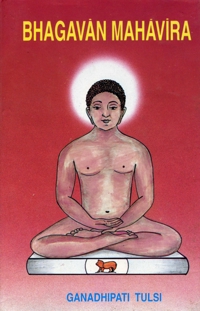| 3 | The Period Of Sadhana |

fter becoming an ascetic, Vardhamana needed no security. He was no longer a private individual now. He began to treat everyone as a welcome visitor with whatever purpose he came. His life of spiritual discipline began with the resolution:
- I dedicate myself to the highest liberation.
- I shall no longer be interested in my physical body and shall bear all kinds of calamities whether they are brought about by gods, human agencies or animals.
- I shall in no case deviate from the path of sadhana (spiritual disciplin).
His sadhana began with the above resolution. This was an exhibition of his spiritual strength. The seeds of spiritual strength are inherent in every man. What is needed is a strong will to enable them to sprout. A weak person will keep them dormant. Vardhamana knew his will. He had been resolute from the very beginning. His willpower began to exert itself. A man who is irresolute becomes a prey to all kinds of fears. Only he who fears needs security. Sramana Vardhamana had shed all fear. He had risen above his old limitations. He took the entire world to be a testing ground of his courage.
Fear remains entrenched in the body. One who attaches no importance to the body is never afraid of anything. By giving up attachment to the body, Vardhamana became fearless.
Fear is born of the desire for possessions or possessiveness. Vardhamana became fearless, because he had assumed an attitude of non-possession.
Fear takes root in us when we feel that we have enemies. Vardhamana became fearless because he assumed an attitude of friendliness towards everyone.
He began to traverse the path leading to infinity. He never thought of what was going to happen to him the next day. He did not care for food, shelter and the inclemency of the weather. All the anxieties disappeared with the renunciation of his interest in his body. He had already discarded his clothes and begun to wander naked. Even a month-long starvation did not interfere with his practice of spiritual discipline. The shades of the forest trees served as a home for him. Sometimes he took shelter in houses, which had been abandoned, or in sequestered temples. Only those who are habituated to putting on clothes, eating regular meals and living in sheltered houses feel difficulties when they do not get these. Vardhamana put on the clothes of self-certainty, began to live in the home of consciousness and to draw strength from subtle spiritual world. He experienced no difficulty.
Having left Ksatriya Kundapura he arrived at Karmaragrama in the evening. He remained standing in a state of meditation near the village. The first day here was the day of test for him.
A farm-boy happened to return to the village from the farm. He had a pair of bullocks with him. He saw the monk standing there. In anticipation that he would look after his bullocks, he left the bullocks with Vardhamana and went away. The bullocks began to graze and in a short time strayed far away. Vardhamana was all along lost into the depths of his soul in a state of intense meditation. It had grown completely dark and nothing was visible. The farm-boy returned after having milked his cows in the village. He could not trace his bullocks. He enquired of Vardhamana about them. Getting no reply from the Sramana he went about in search of them. He searched for them till late in the night but in vain. He was now so tired that he fell asleep. He got up early in the morning and again began the search for his bullocks but again in vein. When he was returning to the village, he found the bullocks standing near the monk. The boy began to feel suspicious about the Sramana whom he thought to be a thug. The presence of the bullocks with the Sramana strengthened his suspicion. He thought that the Sramana would steal the bullocks away. He had kept them hidden last night. Strength of a wrong conviction enraged the farm-boy so much so that he rushed at the Sramana to strike him with the rope he carried. It was a strange coincidence that as the farm-boy raised the rope to strike, Nandivardhana suddenly arrived at the spot.
There is also a heresy that lndra arrived at the spot.
He intervened and persuaded the farm-boy to go. Then he said to the Sramana, "Till yesterday you had commanded the Status of a prince. Nobody could dare to offend you. Today you are in the position of an insignificant man. It's a pity you have no security arrangements. It's intolerable. Let me make security arrangements for you.”
Sramana Vardhamana replied with a smile on his lips, "Whose security? I have deliberately chosen the path of equanimity I have willingly adopted the path of ahimsa. I do not know who needs the security you are speaking of. I am no more in an egocentric body. l am now firmly entrenched in myself. When I was in such a body, I had the longing to live and was afraid of death. I desired comforts and feared pain. I pined for fame and feared being criticised. I was greedy of gains and feared losses. I don't have craving for life any more. Why should I then be afraid of death? Those who have a longing for life fear death. I know what life and death are. I am not at all interested in them. One who has no desire to live will never crave for comforts. The desire for comforts is an expression pf the desire for life. Man wants to live. Once he has begun to live a comfortable life, he desires more comforts. I don't crave to live and, therefore, I don't desire comforts. One who does not run after sensuous pleasure will never be afraid of misery. I have begun to treat pleasure and pain and life and death alike. I am perfectly secure. I am not undefended. I don't need any security."
"Death is as natural as Life", he continued in a serene voice, "Why should we be afraid of it then? Fear creates the need for security. Only he who has no fears can protect others. He who has a longing for life and fears death cannot protect anybody. How can you then protect me?"
Nandivardhana was stunned to hear this. He could not speak any more although he wanted to. Composing himself a little, he cleverly said, "Sire, you are a Mahavira (a great hero). How can I provide security for you? But if you like, I intend to help you a little."
The Sramana replied, "That is also not possible. An arha t needs no help from others. The arhats never needed, don't need now nor in the future shall need any help at all. They achieve the state of perfect knowledge as well as moksa or liberation through their own spiritual exertion. It is their own strength that helps them."
After this bold declaration Sramana Vardhamana came to be known as Mahavira. Nandivardhana said, "Bhagavan, you are indeed a Mahavira. Your resolution, your forbearance, your constancy and your spiritual achievements are really great. You are a great hero. We cannot even think of such courage and fearlessness. We live in the world of give and take; we cannot be so indifferent."
Nandivardhana was correct. There was hardly any exaggeration in his gestures. The involvements in the world do not allow people to take any interest in Truth. The spiritually minded people identify their interests with Truth and as a result they are not interested in worldly affairs. The image of Bhagavan Mahavira, which Nandivardhana had in his mind, was that of a prince born with a silver spoon in his mouth and of a brother living in the midst of the comforts of the palace. Now he saw his brother wandering alone and unknown with no certainty of a shelter and food. He could not relish the prospect of people criticising him for having abandoned his brother in difficulties. But Bhagavan Mahavira lived in a different world. He did not think; he saw. While "thinking" always involves consideration of external situations, "seeing" is related to reality. Mahavira, when he saw, found that while an extrovert was bound by external ties, an introvert was always free. He experienced freedom within himself; he experienced Truth within himself. It is true that once we get attached to the external world, we lose sight of the Existence within and also that once we become absorbed in the Existence within, we become free from the worries of the external world. Mahavira had now attained this slate. Therefore, he did not care a fig for anything including his body, life and death. Absolutely contented and carefree, he began to lead the life of a wandering ascetic.
Most of the sadhakas, during the period of their sadhana, like to live at one place only. Contrary to this, Mahavira wandered from place to place. He was of the opinion that one whose mind is not stable will not be able to concentrate even if he did not wander. On the other hand a wandering state will have the least effect on him whose mind is fixed. Also, how can one who has renounced possessiveness remain confined to any place?
An aspirant to freedom cannot tie himself to a particular place. Mahavira had not yet transcended the body and as such its motion was inevitable in accordance with the laws of nature. Although he remained motionless during the greater part of the day and night, he had to move his body. While wandering, Mahavira was not at all an extremist. He favoured neither motion nor motionlessness absolutely. He had affected a synthesis between the two states.
 Acharya Tulsi
Acharya Tulsi



